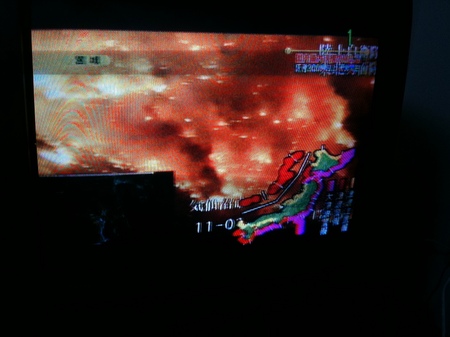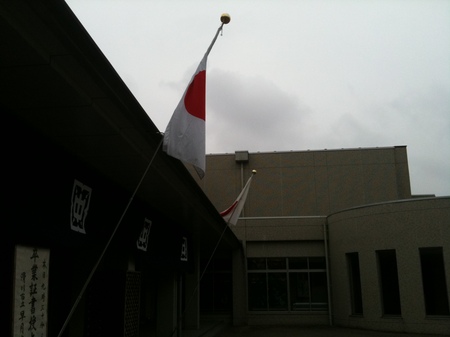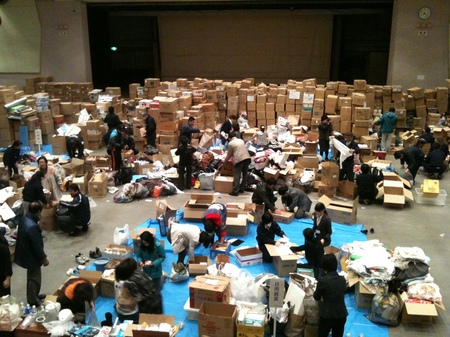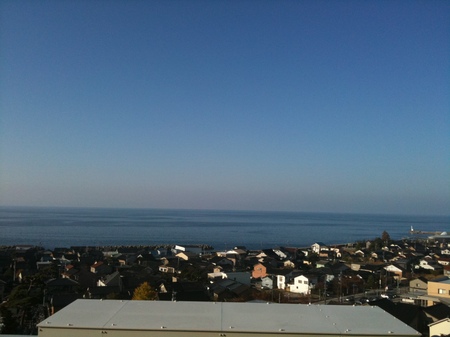| « Time for Participatory Budgeting to Grow? | Chicago For Sale » |
International Chicago Fri Mar 18 2011
Learning from a Japanese Sister City
Namerikawa, Japan
NAMERIKAWA, JAPAN --- In this tiny seaside town, a sister city of Schaumburg, Ill., the mood is very somber though life is certainly continuing on as normal. Adults and children go to work or school everyday. After school, baseball practice remains on schedule. And inside the town's largest grocery store, Plant 3, shoppers are buying food for the week.
But amidst last week's devastating earthquake and tsunami, some things have changed. Volunteers are collecting money inside Plant 3; bare shelves once full of bottled water are being replenished after supplies were sent to the hardest hit areas of Japan; and volunteers are packing up loads of boxes near City Hall to send blankets, toothbrushes and towels to victims of the disaster.
I originally wanted to write about progressive transportation in Japan and in Namerikawa, a seaside town of about 34,000 people. I moved here in July to teach English as part of the JET Programme, and I hope to use some of the things I have learned here for good when I am back in Chicago. But given last week's devastating earthquake and tsunami, it does not seem right to talk about transportation at the moment.
In Namerikawa, we are very lucky. Situated on the west coast of Japan's main island Honshū in Toyama prefecture, Namerikawa and the surrounding areas were not affected by last week's disaster. A little after 2:30 p.m., while at my junior high school, we felt the tail end of the earthquake. My desk started shaking but nothing was falling over and no one was panicking. I looked up from my computer a bit scared. The kind school nurse who sits in front of me held on to her desk. "This is strange," she said.
After only about 15 seconds, the shaking stopped and it was all over. I sighed, and everyone got back to work. We thought everything would be OK, just as Japan was when a 7.3 earthquake hit a few days earlier. It was a slow day at work, so I briefly e-mailed my sister to tell her I was OK and that I just felt an earthquake. "There was another earthquake," I wrote. "This time I felt it at school, but it was pretty little." I had no idea that at that very moment, Japan's "worst crisis since WWII" was just beginning.
My co-workers and I turned on the TV about 30 minutes later. We slowly began to realize the full magnitude of what was happening. We watched in disbelief as the tsunami began ripping through towns directly to our northeast. On TV, I thought I was watching a landslide in an isolated garbage dump. Instead, I was watching towns being crushed instantly. The tsunami was literally ripping through farmland and destroying homes with the force of a jet.

My Japanese TV on March 11, 2011
A week after this tragedy, many of my co-workers and Japanese friends are grieving, but they are doing so with silence, grace and strength. This stoicism is among the admirable traits valued in Japanese society, along with humility, perseverance and kindness. Japanese civil morality encourages everyone to think of the community first, not the individual. Although this part of Japanese culture causes some frustrations from my outsider's perspective, it is in many ways the glue that is keeping Japan together through this crisis. This same notion has been noted very eloquently in essays by the New York Times' Nicholas Kristof and CNN's Kyung Lah.
I was reminded of this two days after the tragedy, when I went out to dinner with a Japanese English teacher who was completing an experiment for her PhD. She was studying communication and wanted to analyze how people from other cultures debate topics differently than the Japanese. Before we began a discussion about cell phones in elementary schools and the death penalty, she took a moment to reflect on Friday's events. "To all the Americans here, I just want to say thank you," she said. "Your president said today on the news that America will do anything it can to help us. We really appreciate it." Her country was being torn apart, yet the first sentiment she expressed was a heartfelt thank you to another country for its help.

Hayatsuki Junior High School in Namerikawa, Japan
On Tuesday, while everyone in Japan was coping with relief efforts, dealing with the threat of a nuclear meltdown and still grieving over the thousands of lives lost, the third-year students in my junior high school graduated. The school year is a little different in Japan, with students attending school year-round and graduating in the spring. Junior high school graduation is one of the most important moments in a young Japanese person's life, as many of them attend different high schools after spending their last year of junior high school studying for selective entrance exams. Many of my students cried, but they seemed happy to move on to the next chapter of their lives.
A day after my school's graduation celebration, I went to class with my second-year students, who will soon become san-nenseis (third-year students). They will spend much of this coming year studying for stressful high-school entrance exams. In class, I read the students an e-mail I received from a teacher in America. Throughout the year, my students were corresponding with American students about their life and cultural differences. The American teacher I worked with had e-mailed me on Friday just hours after the earthquake and tsunami hit.
"I received an e-mail from America," I told my students. "She says she and her students are praying for everyone in Japan. She wants us to stay safe."
Everyone in my class stopped talking and stared at me. Although they couldn't understand every word of English I read, they knew it was about the earthquake and tsunami, and about hope. They looked at me very seriously, almost without blinking.
A few seconds later, the bell rang. Just like they do every day, they stood up from their desks, put their hands to their side and bowed. "Arigatou gozaimasu," (Thank you very much) they said in unison.
I bowed back to them, and slowly walked back to the teachers' room.
For lunch that day, I sat next to Yamanishi-sensei, a Japanese English teacher and Sato-sensei, a math teacher. "You know, he is from Fukushima," Yamanishi-sensei told me, pointing to Sato-sensei. "His family is OK, but he knows many people who lost their lives. He wants to go home, but he cannot drive there. Many roads are closed and he will not be able to get petrol there."
I looked up from my rice stunned to see Sato-sensei's eyes puffy and red. He looked as if he hadn't slept well in days. I had seen him crying on Tuesday but did not know why.
I quietly said to Sato-sensei, "gomennasai" (I am sorry). He nodded and went back to eating.
Later that day, after classes, I noticed that Sato-sensei was at his computer with his headphones on. He was watching a video. I assumed he was glued to the news just as I had been this entire week. As I got closer to his desk, I saw from behind him that he wasn't watching the news. Instead, he was watching a video of his students at graduation. In the video, his students were smiling and about to begin their transition into adulthood.

Volunteers in Namerikawa, Japan pack up blankets and other essentials for earthquake and tsunami victims
One week after the tragedy, we are all still sad about the lost lives and concerned about the Fukushima situation, a problem the American media seems to focus on much more than any other story here. Although the uncertainty of the future unnerves many, including myself, I have learned from my Japanese sister city how to handle crises with dignity, sensitivity and community.
I hope that nothing similar to the magnitude of Friday's earthquake and tsunami ever, ever hits the Chicago area. We are very fortunate to be relatively free of large natural disasters. Nature does not kill us often, but unfortunately violence consumes many, and we kill each other. But if anything of this magnitude ever does happen, I will be looking once again to Japan as a model country that shows us how citizens can handle disaster with grace, peace, and most of all, how to handle tragedy together.
Sheila Burt
Namerikawa, Japan
March 18, 2011













Kyle Jewett / March 21, 2011 8:23 PM
Sheila,
I was an ALT at Namerikawa JH from 2005 to 2009. I really enjoyed reading your article. This is exactly how I felt Namerikawa would act, feel, and respond, and I felt comfort in hearing about my former town. Thank you for sharing your thoughts. Good luck during the rest of your time in Japan, and please say hi to everyone at the Education Center for me.
-kyle